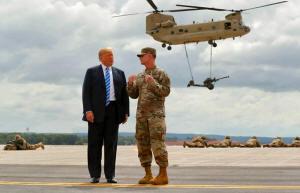|
Trump signs defense policy bill with
watered-down China measures
 Send a link to a friend
Send a link to a friend
 [August 14, 2018]
By Jeff Mason [August 14, 2018]
By Jeff Mason
FORT DRUM, N.Y. (Reuters) - U.S. President
Donald Trump signed a $716 billion defense policy bill on Monday that
authorizes military spending and includes watered-down controls on U.S.
government contracts with China's ZTE Corp and Huawei Technologies Co
Ltd [HWT.UL].
Trump signed the law at the U.S. Army's Fort Drum base in upstate New
York on his way back to Washington after a 12-day working vacation at
his golf club in New Jersey. The bill was named for one of Trump's
political critics, the ailing U.S. Senator John McCain of Arizona, but
he did not mention McCain's name.
McCain said in a statement he was "humbled" the bill was named after
him, adding that it will address "a growing array of threats."
Trump later made a reference to McCain at a political fundraiser in
Utica, New York, knocking him - as Trump does repeatedly - for voting
against a bill to repeal parts of President Barack Obama’s signature
healthcare reform law last year.

Even though Trump said the bill "is the most significant investment in
our military and our war-fighters in modern history," Obama's first
three defense budgets were larger, when adjusted for inflation,
according to Todd Harrison at the Washington-based Center for Strategic
and International Studies.
WEAK ON CHINA
Some lawmakers wanted to use the bill to reinstate tough sanctions on
ZTE to punish the company for illegally shipping products to Iran and
North Korea, but the restrictions included in the final National Defense
Authorization Act, or NDAA, that passed Congress were weaker than
earlier versions of the bill.
Trump has lifted an earlier ban on U.S. companies selling to ZTE,
allowing China's second-largest telecommunications equipment maker to
resume business and putting him at odds with both Republican and
Democratic lawmakers.
Leaders of U.S. intelligence agencies have said they are concerned that
ZTE, Huawei Technologies Co Ltd and some other Chinese companies are
beholden to the Chinese government or Communist Party, raising the risk
of espionage.
In response to the bill, Huawei said in a statement to Reuters, "Huawei
supports the US government's goals for better security, but this random
addition to the NDAA is ineffective, misguided, and unconstitutional."
[to top of second column]
|

President Donald Trump talks with U.S. Army Major General Walter
“Walt” Piatt, the Commanding General of the Army's 10th Mountain
Division and Fort Drum as the president observes a demonstration
with troops and a helicopter carrying an artillery piece at Fort
Drum, New York, U.S., August 13, 2018. REUTERS/Carlos Barria

"It does nothing to identify real security risks or improve supply
chain security, and will only serve to stifle innovation while
increasing internet costs for US consumers and businesses," Huawei
said.
The White House opposed putting stronger measures against the
companies in the bill, and the measures were softened before
lawmakers held their final vote.
The NDAA does strengthen the Committee on Foreign Investment in the
United States (CFIUS), which reviews proposed foreign investments to
weigh whether they threaten national security. That measure was seen
as targeting China.
Separately, the NDAA authorizes spending $7.6 billion for 77 F-35
Joint Strike Fighter jets, made by Lockheed Martin Corp.
The bill also directs the Secretary of Defense to study whether
Turkey's planned deployment of the Russian-made S-400 missile
defense system will risk the security of several U.S.-made weapons
used by Turkey, including the F-35 jet. The mandate to produce a
study came after an earlier version proposed to bar the delivery of
F-35s to Turkey.
Prior to the ceremony Trump watched an air assault demonstration by
U.S. troops at Fort Drum.
(Reporting by Jeff Mason in Fort Drum, New York, Patricia Zengerle,
Phil Stewart and Mike Stone in Washington, and Sijia Jiang in HONG
KONG; editing by James Dalgleish & Simon Cameron-Moore)
[© 2018 Thomson Reuters. All rights
reserved.]
Copyright 2018 Reuters. All rights reserved. This material may not be published,
broadcast, rewritten or redistributed.
Thompson Reuters is solely responsible for this content.
 |